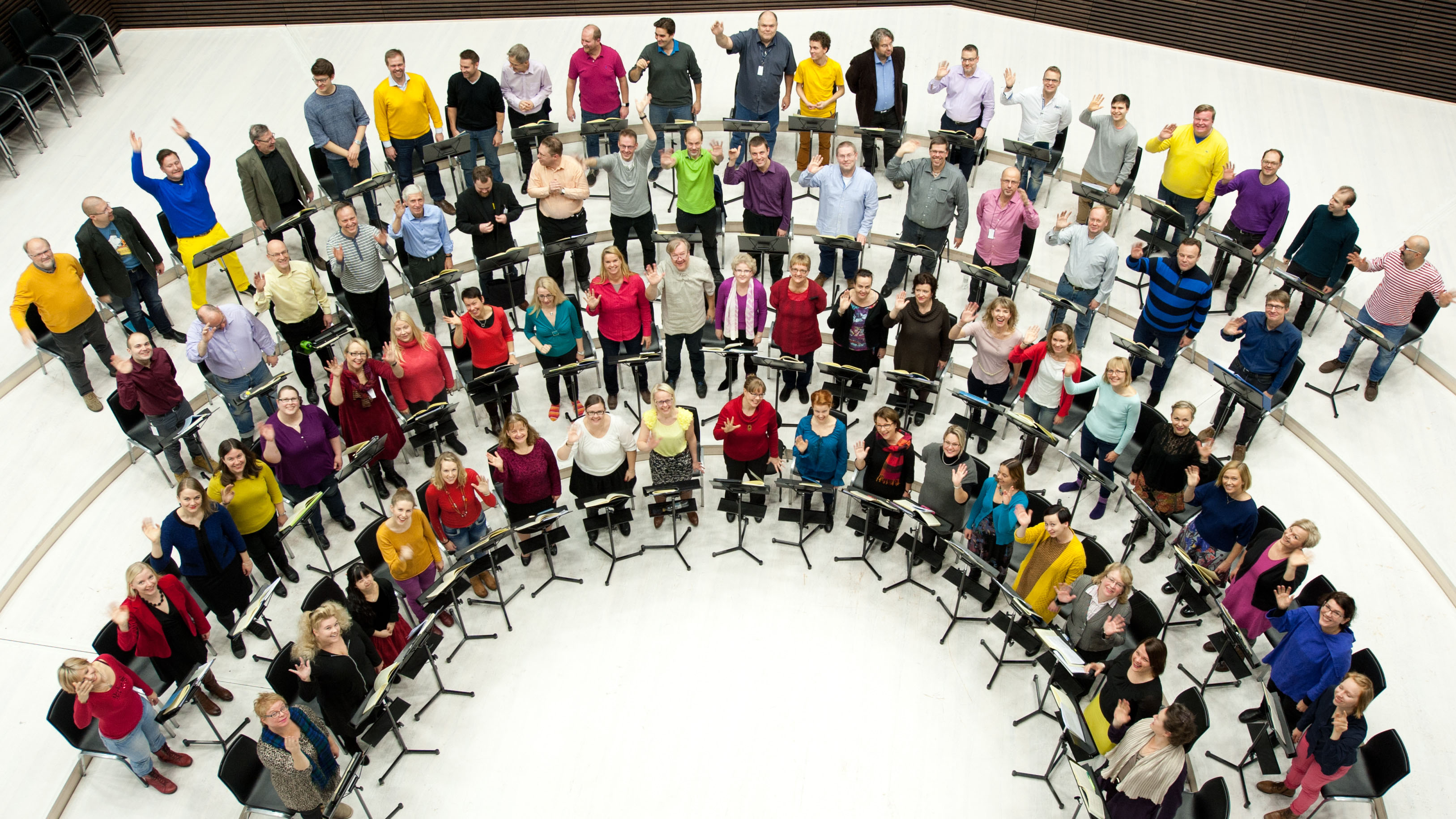The Helsinki Music Centre Choir blows out ten birthday candles with works whose composers have been enchanted by poetry and painting.
The majestic silence and mystical atmosphere of Piero della Francesca’s frescoes fascinated Bohuslav Martinů. On his summer holiday, Johannes Brahms was moved by a poem by Friedrich Hölderlin and immediately hurried to the sandy beach to sketch a piece. Alex Freeman’s new work is an extensive choral symphony that draws on the ecstatic optimism and energy of verses by four American poets.
Nils Schweckendiek
Tonight’s programme reflects both the history of the Helsinki Music Centre Choir and its conductor’s close relationship with contemporary music and that of Martinů. The work by Freeman, an inventive choral composer whose instrumental music is little known in Finland, was a commission to celebrate the Choir’s 10th anniversary. Brahms’ German Requiem was the work with which the Choir made its debut in 2012, with the Finnish Radio Symphony Orchestra. “Schicksalslied is far too seldom performed in Finland,” says Schweckendiek, “and is a rare work in that the soloist is the choir, not individual singers. It lasts about an hour, so we have paired it with the late piece by Martinů, again not often heard in Finland.”
Born in Germany and raised in England, Nils Schweckendiek has been making his mark in Finland since 2000. He is best known as a specialist in contemporary choral music but is equally at home in early and contemporary, chamber, symphonic and operatic repertoire. He has been Artistic Director of the Helsinki Music Centre Choir since 2017.
The Helsinki Music Centre Choir
Founded in autumn 2011 on the initiative of conductors Hannu Lintu, Jukka-Pekka Saraste and John Storgårds, the Helsinki Music Centre Choir of about 90 singers can, as required, regroup from a symphony to a male, female or chamber choir. It works in partnership with all the main Helsinki Music Centre occupants: the Helsinki Philharmonic Orchestra, the Finnish Radio Symphony Orchestra and the Sibelius Academy. Its Artistic Director was composer Tapani Länsiö from its formation until the beginning of 2017, when he handed over to Nils Schweckendiek and Jani Sivén. The members of the choir are amateurs with a passion for singing. The HMCC repertoire, planned jointly by the Helsinki Philharmonic Orchestra and the Finnish Radio Symphony Orchestra from a long-term perspective, consists primarily of symphonic choral and orchestral works. The Choir also performs a cappella works for large choir. The Choir appears mainly at the Helsinki Music Centre but also at events such as the Organ Night and Aria festival in Espoo, the Turku Music Festival and the Ekenäs Summer Concerts. The Helsinki Music Centre Choir is recruiting more singers. For details of auditions see www.musiikkitalonkuoro.fi.
Johannes Brahms: Schicksalslied for choir and orchestra, Op. 54
Johannes Brahms (1833–1897) was so taken with the poems of his fellow German Friedrich Hölderlin that in 1868 he began setting one of them to music for choir and orchestra. Most of all he was impressed by the poem Hyperions Schicksalslied telling of the titan Hyperion in Greek mythology. The Song of Destiny is one of the few works by Brahms for choir and orchestra, and nowadays the most popular. Edwin Evans translated the poem as follows in 1912:
Ye wander gladly in light / Through goodly mansions, dwellers in Spiritland! / Luminous heaven-breezes / Touching you soft, / Like as fingers when skilfully / Wakening harp-strings. / Fearlessly, like the slumbering Infant, abide the Beatified; / Pure retained, Like unopened blossoms, / Flowering ever, / Joyful their soul / And their heavenly vision / Gifted with placid / Never-ceasing clearness. / To us is allotted / No restful haven to find; / They falter, they perish, / Poor suffering mortals / Blindly as moment / Follows to moment, / Like water from mountain / to mountain impelled, / Destined to disappearance below.
Bohuslav Martinů: Les Fresques de Piero della Francesca
Settling in France in 1953 after spending the war years in America, Czech composer Bohuslav Martinů (1890–1959) came across a book of photos of the frescoes by the Renaissance artist Piero della Francesca based on a 13th-century book of Christian legends and stories. Eager to see the frescoes for himself, he travelled to Arezzo in Italy in 1954 and was so impressed with what he saw that he composed a three-movement orchestral suite. His aim was, he said, not to tell the story told in the eight fresco scenes but “to give voice to the majestic, icy silence, as well as the strange, peaceful poetry of the paintings, and to express the colourful, mysterious atmosphere in music.” He nevertheless revealed that the first movement alludes to the meeting of Solomon and the Queen of Sheba, and the second to the dream of the 4th-century Roman Emperor Constantine of an angel pointing to a cross in the sky.
Alex Freeman: Ghost Light
Born in the USA (in 1972) but now living in Finland, Alex Freeman composed his choral symphony Ghost Light as a commission from the Helsinki Music Centre Choir. The work was inspired by the comments on the Covid pandemic of US poet Rob Hardy. Says Freeman:
“A ‘ghostlight’ is a light traditionally left shining on the stage of an otherwise dark and empty theatre. During pandemic closures, many theatres kept ghostlights burning to represent the promise of returning to the stage – the light at the end of the tunnel. I wanted to write about how our eyes adjust to and even find beauty in the dark. I also wanted to write about how we, through our creativity and our caring for one another, carry the light forward.
“My symphony traverses the ever-expansive ‘travelling’ spirit of Whitman and John Gould Fletcher to James Agee’s crystalline moment of wonder at eternity and consolation in the face of loss, and ends jubilantly with Hardy’s Ghostlight.”

